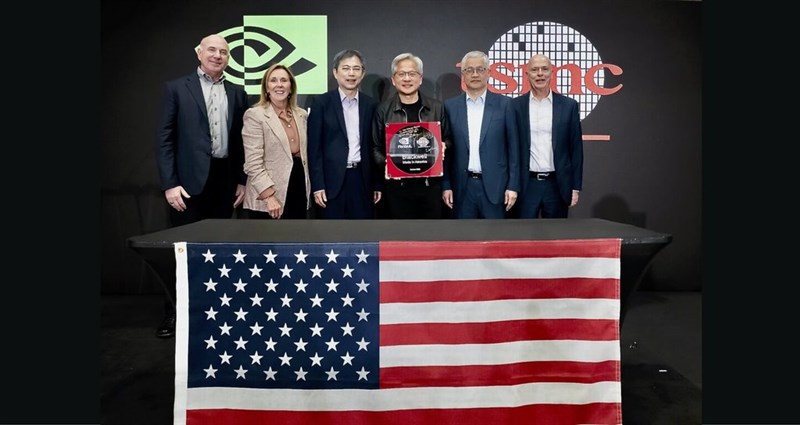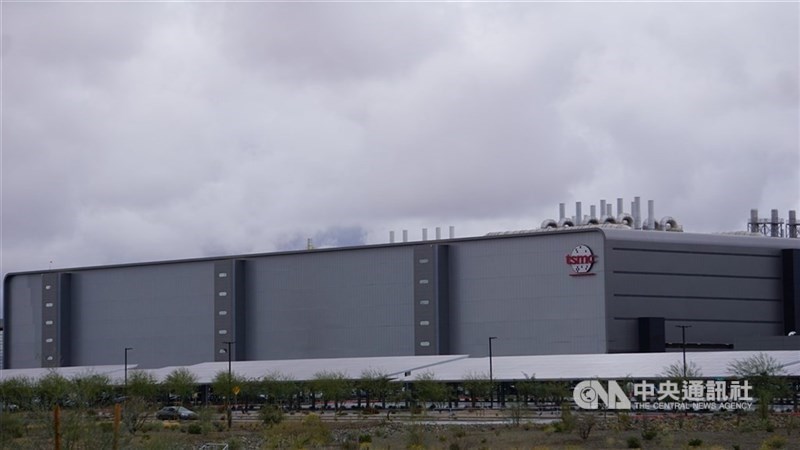Nvidia's Jensen Huang, TSMC celebrate first U.S.-made Blackwell chip

San Francisco, Oct. 17 (CNA) Jensen Huang (黃仁勳), founder and CEO of U.S.-based artificial intelligence chip designer Nvidia Corp. and Taiwan Semiconductor Manufacturing Co. (TSMC) on Friday celebrated the first Nvidia Blackwell wafer produced on U.S. soil.
Huang visited TSMC's advanced wafer fab in the U.S. state of Arizona and joined the Taiwanese chipmaker's executives to witness the efforts to "build the infrastructure that powers the world's AI factories, right here in America," the American AI chip giant said in a statement.
At the event, Huang joined Y.L. Wang (王英郎), vice president of operations at TSMC, in signing their names on the Blackwell wafer to mark the milestone, which demonstrated that the engines of the world's AI infrastructure are now being constructed domestically in the United States.
The debut of the first U.S.-made Blackwell chip has bolstered the U.S. supply chain and onshored the AI technology stack to turn data into intelligence and secure the country's global leadership during the current AI era, Nvidia said.

According to Nvidia, its Blackwell architecture graphics processing unit (GPU) contains 208 billion transistors and is being rolled out using TSMC's sophisticated custom-built 4NP process. Nvidia added that the GPU ushers in the next chapter in generative AI with unparalleled performance, efficiency, and scale.
"This is a historic moment for several reasons. It's the very first time in recent American history that the single most important chip is being manufactured here in the United States by the most advanced fab, by TSMC, here in the United States," Huang said in the statement.
"This is the vision of President Trump of reindustrialization -- to bring back manufacturing to America, to create jobs, of course, but also, this is the single most vital manufacturing industry and the most important technology industry in the world," Huang added.
TSMC is investing US$65 billion in Arizona to build three advanced wafer fabs with the first starting mass production in 2024, using the 4 nanometer process. The world's largest contract chipmaker also pledged in March to invest an additional US$100 billion in Arizona over the next few years to build three more wafer fabs, two IC assembly plants, and one research and development center.
"To go from arriving in Arizona to delivering the first U.S.-made NVIDIA Blackwell chip in just a few short years represents the very best of TSMC," TSMC Arizona CEO Ray Chuang (莊瑞萍) said in the same statement.
"This milestone is built on three decades of partnership with NVIDIA -- pushing the boundaries of technology together -- and on the unwavering dedication of our employees and the local partners who helped to make TSMC Arizona possible," Chuang said.
Nvidia said in the statement that TSMC's manufacturing compound in Arizona will produce chips using advanced 2nm, 3nm, 4nm, and A16 processes, and these technologies are critical to emerging technologies, including AI applications, telecommunications, and high-performance computing (HPC) devices.
"America-based manufacturing is crucial to meeting the growing demand for AI," Nvidia said.
In addition to Nvidia, other American tech giants such as Apple Inc. and Advanced Micro Devices, Inc. (AMD) are believed to have outsourced chipmaking to TSMC in Arizona.
In an investor conference held on Thursday, TSMC Chairman and CEO C.C. Wei (魏哲家) said the company will speed up its pace in production expansion and technology upgrades in Arizona, aiming to build its complex in the state into a megafab cluster to meet strong demand from the U.S. market.
-
Society
Taiwan headline news
02/21/2026 01:21 PM -
Culture
From studio to hangars: Scale artist paints Army helicopters
02/21/2026 12:09 PM -
Society
Liyu Lake pedal boat operator released on bail after 9-year-old drowns
02/20/2026 08:12 PM -
Society
Frontal weather systems forecast to impact Taiwan Tuesday evening
02/20/2026 07:34 PM -
Society
Vietnamese workers abroad mark Tết through video calls
02/20/2026 07:27 PM